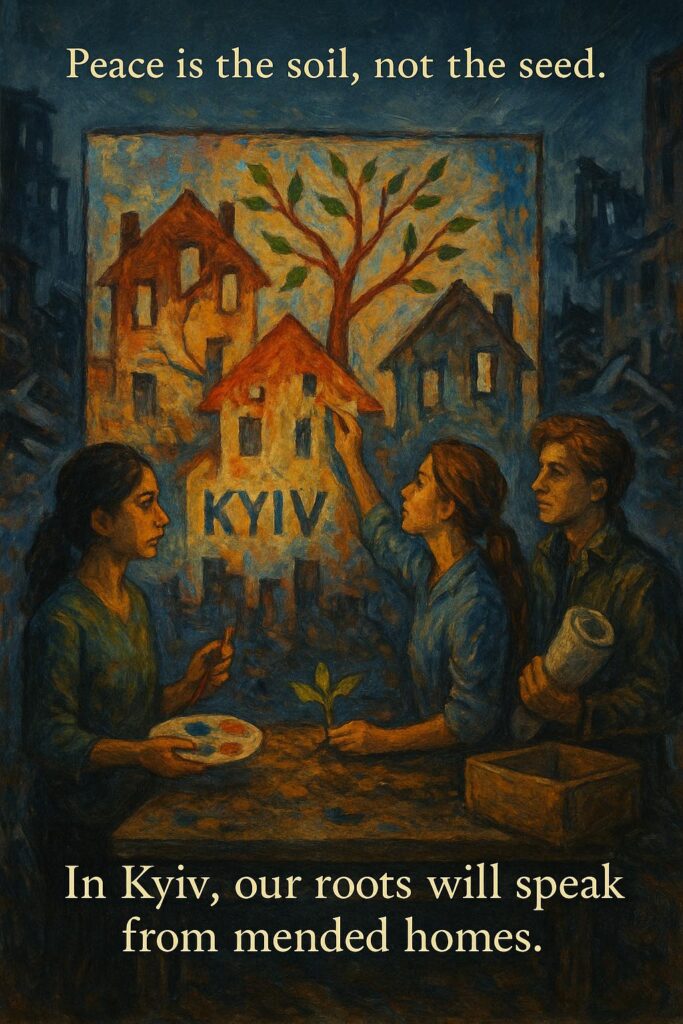
The greenhouse felt smaller on January 6, 2026, its patched glass fogged with the breath of winter. Emil stood by the scarred table, the ledger open to the Law of Losing and Gaining entry, its pages still warm from the night’s writing. The seedling tray beside him held basil and beans, their leaves curling inward against the cold—a quiet echo of the courtyard’s new life.
On the laptop screen, two messages glowed side by side.
The first—a headline of hope: UN Youth Forum—Kyiv Pilot Approved. March 2026. Send Keepers.
The second—a test of endurance: Councilor Hargrove: Feasibility Report Required by January 15, or Funding Review.
The Circle gathered in the greenhouse, bundled in coats, their breath faint clouds against the frosted glass. Aisha leaned against the wall, sleeves streaked with East Riverton’s mural colors, sketching a bridge for Kyiv. Jaden hunched over a blueprint, crafting a portable canopy from Westfield’s promised scrap. Priya adjusted her headset, scrolling through Ukrainian reports—air raid alerts, displaced children, frozen fields. Mina sat cross-legged, sorting quiet box slips, her fingers pausing on one that read: We’re safer now.
Emil’s voice broke the hum of the heaters. “We’re going to Kyiv,” he said softly. “But how do we plant anything there? The soil’s rubble.”
Aisha looked up, eyes steady. “We start small. Like East Riverton. A mural, a box, a circle. They need to see us—not just hear about us.”
Jaden nodded. “The canopy’s key. Shelter for circles, even if bombs fall. Westfield’s metal can hold.”
Priya frowned, scrolling through data. “The UN wants numbers, but Hargrove’s report could choke us. Ukraine’s no East Riverton. A 15% reduction won’t mean much next to craters.”
Mina whispered, “But maybe it’s not about percent. They’ve lost homes, families. Our slips might mean more there.”
Emil touched the basil leaf in his pocket—the one he had kept since the first mural—and thought of Grandfather’s voice: Peace is the soil, not the seed.
He nodded slowly. “We go with humility. No demands, no headlines. Just presence. Grandfather said peace grows when no one’s trying to own it. We’ll show them roots can hold, even in rubble.”
The door creaked open. A gust of wind carried in a swirl of snow—and with it, a girl in a gray coat. She pulled back her hood, her dark hair damp, her eyes the color of storm clouds.
“I’m your keeper for Kyiv,” she said. “Olena. My family’s from Donbas. I know the language. The fear.”
Aisha smiled gently. “Then you’re part of the roots now. What’s it like there?”
Olena hesitated. “My cousin’s shelter was hit last year. They’re alive, but… everything’s gone. Kids there need more than food—they need to be seen.”
Emil’s eyes met hers. “Then we start with that. A mural of mended homes. Quiet boxes for voices that never got to speak.”
That night, they worked under the hum of the heaters.
Aisha laid out paints—reds for courage, blues for memory, gold for dawn.
Jaden tested the canopy frame, its metal groaning before holding firm.
Priya drafted the feasibility report, citing East Riverton’s 15% conflict drop and 30 community entries.
Mina copied slips into a digital archive labeled Human Voices—For Kyiv.
Olena sketched a cracked roof, its fractures filled with branches—a home reborn through roots.
By midnight, the greenhouse glowed like a small sun against the frost.
Emil sat at the table when the others left, the ledger before him, its pages breathing warmth into the cold. He began to write.
Ledger Entry — Seeds in the Rubble
Date: January 6, 2026
Symptom: Kyiv pilot approved; council demands feasibility report amid war skepticism.
Disease — The Four Absences (Global):
-
Absence 1 (Exclusion): Limited resources and oversight threaten reach.
-
Absence 2 (Vengeance): Hargrove’s skepticism echoes past sabotage, breeding mistrust.
-
Absence 3 (Dehumanization): Youth capacity dismissed under guise of “war realism.”
-
Absence 4 (Unheard Cry): Displaced children’s voices risk being drowned by policy noise.
Investigator’s Response:
Team assembled: Aisha (mural lead), Jaden (canopy engineer), Priya (analyst), Mina (archivist), Olena (cultural keeper). Supplies packed, canopy designed, report drafted with empathy metrics replacing conflict reduction figures.
Outcome:
Feasibility report in progress; pilot preparations underway; local keeper integrated.
Note:
Seeds begin unseen—their strength lies in the rubble they claim.
Emil closed the ledger, the ink still glistening beneath the lamplight. The basil and bean leaves unfurled slightly under the warmth, their silhouettes trembling like small prayers.
Outside, Crestview slept beneath a quiet snow. The city’s lights blurred through frost.
Emil whispered to the glass, “The soil remembers.”
And somewhere beneath that frozen ground, unseen roots stirred—quietly, patiently, preparing to bloom.
He lingered a moment longer, watching his reflection merge with the frost. The ledger before him glowed faintly, its words alive yet incomplete. They had built circles, painted bridges, and restored trust in broken places—but now the world asked for more. He had learned to tend soil in neighborhoods; now he was being called to understand the climate of nations. The ledger spoke of roots, Emil thought, but not yet of the forest.
He turned down the lamp and resolved to find Grandfather tomorrow—to seek the language of peace at scale.

